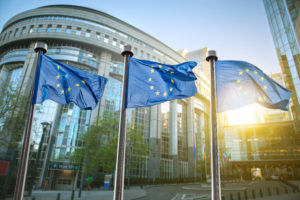Highlights from the Past Weeks
CW 26 / Monday, 26 July to Thursday, 29 July: Committee Meeting Week (Brussels);
DATA ACT – TRILOGUE SUCCESSFULLY COMPLETED: The representatives of the European Parliament and the Council reached an informal agreement on Tuesday in the negotiations on the Data Act. The Data Act sets rules for sharing data generated by the use of connected products or related services (e.g. the Internet of Things, industrial machinery) and allows users to access the data they generate. It will contribute to the development of new services, especially in the field of artificial intelligence, where large amounts of data are needed to train algorithms. In addition, customer service and repairs of connected devices are to become cheaper. The new law says that public agencies can access and use private sector data in exceptional circumstances or emergencies such as floods and wildfires.
In a next step, the informal agreement must be approved by both the Parliament and the Council. (See EP press release and Council press release)
EIDAS – POLITICAL AGREEMENT REACHED IN TRILOGUE: During the third trilogue on 28 June, the co-legislators reached a preliminary agreement on the dossier. The text of the agreement is not yet publicly available. However, the press release published by the Council provides information on the main elements of the compromise, which can be summarised as follows:
The provisional agreement further develops the concept of the wallet and its interaction with national electronic identification (eID) solutions. The wallets are to be issued within the framework of an eID system that corresponds to the high level of security. In addition, the text provides for a harmonised safety concept and common standards to be developed with the Member States.
Furthermore, the provisional agreement clarifies that the issuance, use and revocation of such wallets, as well as the possibility of electronic signatures, shall be free of charge. The provisional agreement would also further align the measure with existing EU cybersecurity legislation and allow Member States to designate public and private bodies accredited to certify the wallet. (See Contexte, paywall, FR; 4-column document of 23 June – PDF)
However, the news from the Green parliamentary group casts doubt on the status of the dossier: The Council’s announcement of a political agreement “hides the middle of the ground truth”, writes Policy Adviser Christian Bulumac on Linkedin. “[This] deal focused on 11 important points, setting the directions but the text is not yet there, so more technical work needs to be done, and the Spanish Presidency might need to hold another political meeting to endorse the tens of articles still open,” he continued. “We struck a deal, not the final deal”. (See Contexte, Paywall, FR)
CHILD ABUSE – INTERNAL MARKET COMMITTEE CONFIRMS OPINION: The Internal Market Committee of the European Parliament (IMCO) voted on Thursday in favour of the opinion on the CSAM Regulation on the basis of the compromise amendments (PDF). The opinion on the draft EU anti-crime law was supported by 35 MEPs, three voted against and three abstained.
With this, the MEPs explicitly declare to protect end-to-end encryption and reject content scanning to find criminals. The opinion deletes detection orders for grooming and deletes the different treatment of known or new CSAM. Communications via number-based services have been removed from the scope of discovery orders. Accountability in the discovery order process, including that discovery orders should be a last resort and that they should be targeted at “specific users or groups of users” of a service, has been clarified.
FREEDOM OF THE MEDIA – OPINION ADOPTED IN THE INTERNAL MARKET COMMITTEE: Last Thursday, the Internal Market Committee (IMCO) adopted the opinion on the European Media Freedom Act (EMFA). On the basis of the compromise amendments (PDF), the statement contains the following main points, among others: Online platforms must immediately seek contact with news providers if they want to remove their content and deal with complaints within 24 hours. The text includes the clarification that “nothing in this regulation shall be construed as prohibiting, restricting or undermining the provision or the use of encrypted services.
The opinion is not binding on the lead Cultural Affairs Committee. However, the rapporteur, S. Verheyen (EPP, DE), and her colleagues from the Culture Affairs Committee will have to take this report – as well as the opinion of the Justice Committee – into account when finalising the Parliament’s position. The Justice Committee hopes to finalise its own opinion next week. The deliberations in the Culture Committee are expected to continue throughout the summer, with a vote planned for September. (See Politico Pro, Paywall)
CYBERSECURITY – IMCO ADOPTS OPINION: Last week, the EP’s Internal Market Committee (IMCO) first held a discussion on the opinion on the Commission’s proposal for a regulation on horizontal cybersecurity requirements for products with digital elements(video, 10:28) before adopting the text the following day.
Following the adoption of the opinion, the amendments proposed in the opinion concerning matters falling within the exclusive competence of the IMCO should be adopted by the lead Committee on Industry, Research and Energy (ITRE) without a vote.
IMCO MEPs may table in plenary the amendments proposed in the opinion on issues falling under the shared competence of the committees involved if they are not adopted by the ITRE Committee in charge.
The vote on the draft opinion and the amendments tabled to it is provisionally scheduled for 19 July 2023 in the ITRE Committee.
ENERGY – ITRE COMMITTEE CONFIRMS TRILOGUE RESULT: The European Parliament’s Industry Committee (ITRE) last week approved the agreement reached with the Council (PDF) to promote renewable energy in line with the Green Deal and REPowerEU (RED III) initiatives.
The agreement, originally reached with the Swedish Presidency on 30 March, aims to increase the share of renewable energy in the EU’s final energy consumption to 42.5% by 2030. Member States are encouraged to aim for a share of 45%.
The directive will be put to a vote in the European Parliament’s plenary session from 11 to 14 September in Strasbourg. It must then be confirmed by the Council. (See EP press release)
ARTIFICIAL INTELLIGENCE – OPEN LETTER FROM EUROPEAN LEADERS: In an open letter on the EU’s efforts to regulate AI, over 150 executives warn: “[The] draft legislation would jeopardise Europe’s competitiveness and technological sovereignty without effectively tackling the challenges we are and will be facing.” The undersigned are also of the opinion that “wanting to anchor the regulation of generative AI in law and proceeding with a rigid compliance logic is as bureaucratic of an approach as it is ineffective in fulfilling its purpose.”
The list of signatories ranges from Danone, Renault, Deutsche Post, Siemens, Deutsche Telekom, United Internet to Meta and includes, in particular, the former French Secretary of State for Digital Affairs, Cédric O.
The latter stresses that “the outcome of implementing the European Parliament’s version [of the AI Bill] would be catastrophic”, adding that “it would potentially be the final nail in the coffin for European technological sovereignty.” O advises European decision-makers to “return to the original spirit of the text and propose a regulation that does not preempt Europe’s future”.
The signatories believe that “European law should limit itself to formulating general principles in a risk-based approach”. In this context, they see a role in entrusting the implementation of these principles to a special regulatory authority at the EU level composed of experts. (See Reuters, EN; Handelsblatt, Paywall, DE)
Contexte(paywall, FR) has, in the meantime, published a 4-column document dated 29 June (PDF). The next trilogue is scheduled for 18 July.
TELECOMMUNICATIONS – NEW DIRECTOR GIVES OVERVIEW OF EU PROJECTS:
The freshly appointed director for digital decade and connectivity at DG CNECT, Kamila Kloc, last week gave a glimpse of what to expect in the coming weeks.
– The Commission’s “investment and funding needs for the Digital Decade targets” study estimates the investment gap for telecoms networks to be about €174 billion, and that’s actually just a “conservative figure”, Kloc emphasised.
– The first report on the “state of the digital decade,” assessing the performance of Member States when it comes to their digital transformation, should be out in September (it was originally scheduled for June).
– The Gigabit Recommendation, whose draft drew some criticism from both EU regulators and alternative operators, will be issued in September too, Kloc said.
– There still isn’t a concrete timeline, however, for the much-anticipated summary report of the consultation on the future of connectivity (which is still expected sometime this summer). “Half of the department is working on analysing the responses,” she added.
– What’s “very much coming,” Kloc stressed, is the Commission’s efforts to tackle the barriers to the single market and to “facilitate the consolidation”; both issues which rank very high on the operators’ wish list. (See Politico Pro, Paywall)
DIGITAL DECADE 2030 – COMMISSION ADOPTS INDICATORS AND ISSUES GUIDELINES: Last week, the EU Commission adopted the key performance indicators (KPIs) to measure progress towards the 2030 Digital Decade goals. It has also issued guidelines on how Member States should structure their national roadmaps to achieve the digital goals. (See press release COM)
DIGITAL SERVICES ACT – ZALANDO GETS CJEU TO HELP: Online retailer Zalando has filed a complaint with the Court of Justice of the European Union (CJEU) against its classification as a “particularly large online platform” under the Digital Services Act (DSA).
Zalando cites the classification based on user numbers as the main point of criticism. There is neither a clear methodology nor standardised criteria for what constitutes “active recipients of the service”, Gentz wrote on Linkedin. Zalando had reported the number of visitors to its listings. Others would have provided logged-in figures or no figures at all, Gentz said.
As a result, the Commission had, in Zalando’s opinion, decided “on a random and inconsistent basis” when classifying it as a “Very Large Online Platform” (VLOP).
ALGORITHMS – BELGIUM WANTS EUROPEAN AGENCY: The Belgian EU Presidency, which will take place in the first half of 2024, will support the idea of an agency with technical expertise in algorithms, said Mathieu Michel, Belgian State Secretary for Digitalisation, in an interview with Politico (EN).
The planned organisation is modelled on the European Medicines Agency (EMA) and the Cyber Security Agency (Enisa). This new structure would therefore be useful in the context of the DSA and the future AI Act.
E-EVIDENCE – COUNCIL ADOPTS TEXT AND CONCLUDES PROCEEDINGS: After the Permanent Representatives Committee (Coreper II) approved the European Parliament’s position in the first reading on 21 June, the Ministers of the Member States of the General Affairs Council adopted the text without debate (as an A item on the agenda) on 27 June.
The regulation is thus deemed to have been formally adopted at the first reading, and the legislative procedure is concluded. The next step is the official signing in a plenary session and the publication in the Official Gazette.
The European Production and Retention Order Regulation shall be binding in its entirety in all Member States and shall become applicable 36 months after its entry into force. The Directive on the designation of establishments and the appointment of legal representatives must be implemented within 30 months of its entry into force.
GREAT BRITAIN – CHANGES TO THE ONLINE SAFETY BILL: The UK government published a number of amendments to its Online Safety Bill last week. They are designed to prevent minors from viewing pornography by holding websites to a “higher standard” of age assessment and verification. The text also aims to limit minors’ contact with harmful content and give adults more control over social networking recommendation systems.
The government also plans to make it easier for the coroner or the family to access the data of a deceased minor if the regulator Ofcom so orders. The planned rules, including the codes of conduct, are to apply from the entry into force of the new law. It is currently being discussed in the House of Lords of the British Parliament. Its passage through parliament may still take several months, Reuters estimates. (See Reuters)
Relevant publications, including from the EP Think Tank:
- Audiovisual and Media Policy (EU Fact Sheets)
- A Digital Agenda for Europe (EU Fact Sheets)
- The internal market: general principles (EU Fact Sheets)
- The ubiquitous digital single market (EU Fact Sheets)
- Affordable communication options for businesses and consumers (EU Fact Sheets)
- Resource efficiency and the circular economy (EU Fact Sheets)
- Personal data protection (EU Fact Sheets)
- Policy for research and technological development (EU Fact Sheets)
- Ecodesign for sustainable products (Briefing)
- Artificial intelligence act (Briefing)
- Online piracy of live events (At a Glance)
Selected consultations
- Draft BEREC Report on practices and challenges of the phasing out of 2G and 3G – Feedback on the report: 13 June to 15 August 2023
- Cyber Solidarity Act – feedback on the act: 20 April 2023 until 20 July 2023 (extended)
Outlook for the Current Week
You can find a list of the upcoming dates of the European Parliament here. The meeting calendar for 2023 is available here (PDF) and for 2024 here.
You can find an overview of the most important dates of the week of the Council here or the meeting calendar here.
The official calendar and the priorities of the new Spanish Presidency can be found on the dedicated website. A first draft of the 2024 Belgian Presidency calendar (PDF) has been published by Politico.
Council appointments include:
Summits and Ministerial Meetings:
- none
Preparatory Bodies:
- Horizontal Working Party on Cyber Issues (including Commission priorities), Monday, 3 July (Agenda);
- Horizontal Working Party on Enhancing Resilience and Countering Hybrid Threats, Tuesday, 4 July;
- Working Party on Law Enforcement (Police) (including CSAM), Wednesday, 5 July (Agenda);
- Working Party on Telecommunications and Information Society (including the work programme of the Commission and the Spanish Presidency, AI Act), Wednesday, 5 July (Agenda);
- Working Party on Competitiveness and Growth (Industry) (including IPCEI, chips), Tuesday, 4 July (Agenda), Wednesday, 5 July (Agenda) and Friday, 7 July;
- Working Party on Tax Questions (indirect taxation), Thursday, 6 July (Agenda);
- Working Party on Competitiveness and Growth (Single Market), Friday, 7 July;
- Coreper I, Wednesday, 5 July (Agenda);
- Coreper II, Wednesday, 5 and Friday, 7 July (Agenda);
Information about the weekly Commission meeting can be found on the website of the Commission in the preview (PDF) or (at short notice) in the current agenda. The non-legislative proposal on the metaverse is now due on 11 July.
The following topics are on the agenda for next week:
- Food and biodiversity package
- Soil law
- Regulation on plants produced by new genomic techniques
- Revision of food waste and textiles aspects of the EU waste framework Directive
- Revision of legislation on seeds and other plant and forest reproductive material
- 2023 Strategic foresight report
- 2023 Annual Rule of Law Report
- Response to European citizens’ initiative: ‘Stop Finning – Stop the Trade!’
The judicial calendar of the ECJ can be found here. The judgment in the case against Facebook/Meta on GDPR issues is expected on Monday(C-252/21).
European Parliament Committees
CW 27 / Monday, 3 July to Thursday, 6 July: Political Group and Committee Meeting Week (Brussels);
LIBE Committee (Civil Liberties)
Current Meetings
- Thursday, 6 July 2023, 9.00-12.30 (Brussels)
Extract from the provisional agenda
The current agenda does not contain any topics directly relevant to the Internet industry.
Further Meetings (calendar)
- Monday, 17 July, 14.30-18.00 (Brussels)
- Tuesday, 18 July 9.00-12.30 and 14.30-18.00 (Brussels)
JURI Committee (Legal)
Current Meetings
- Monday, 3 July, 15.00-17.30 (Brussels)
Extract from the provisional agenda
…
- Policy implications of the development of virtual worlds – civil, company, commercial and intellectual property law issues
JURI/9/11996
| Co-rapporteurs: | |||
| Axel Voss (PPE) Ibán García Del Blanco (S&D) |
|||
| Responsible: | |||
| JURI | |||
- Exchange of views
…
Further Meetings (calendar)
- Wednesday, 19 July (Brussels)
- Thursday, 20 July (Brussels)
Dossiers Timetable (22 June 2023)
ITRE Committee (Industry)
Current Meetings
- none
Further Meetings (calendar)
- Wednesday, 19 July (Brussels)
- Thursday, 20 July (Brussels)
Dossiers timetable (28 June 2023)
IMCO Committee (Single Market)
Current Meetings
- none
Further Meetings (calendar)
- Monday, 17 July (Brussels)
- Tuesday, 18 July (Brussels)
Dossiers timetable (June 2023)
CULT Committee (Culture)
Current Meetings
- none
Further Meetings (calendar)
- Monday, 17 July (Brussels)
- Tuesday, 18 July (Brussels)
Further Parliamentary Calendar Dates
- CW 28 / Monday, 10 July to Thursday, 13 July: Plenary Session Week (Strasbourg);
- CW 29 / Monday, 17 July to Thursday, 20 July: Committee Meeting Week (Brussels);
- CW 30 / Monday, 24 July to Thursday, 28 July: Green Week / Not in session;
- CW 31-33 / Monday, 31 July to Sunday, 20 August: Parliamentary recess;
- CW 34 / Monday, 21 August to Friday, 25 August: Green Week / Not in session;
- CW 35 / Monday, 28 August to Thursday, 31 August: Committee Meeting Week (Brussels).
The current agenda does not contain any topics directly relevant to the Internet industry.




